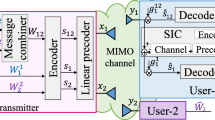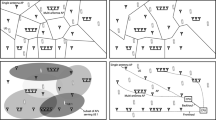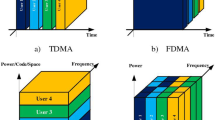Abstract
Cooperative communication for wireless networks has gained a lot of recent interest due to its ability to mitigate fading with exploration of spatial diversity. In this paper, we study a joint optimization problem of jointly considering transmission mode selection, relay assignment and power allocation to maximize the capacity of the network through cooperative wireless communications. This problem is much more challenging than relay assignment considered in literature work which simply targets to maximize the transmission capacity for a single transmission pair. We formulate the problem as a variation of the maximum weight matching problem where the weight is a function over power values which must meet power constraints (VMWMC). Although VMWMC is a non-convex problem whose complexity increases exponentially with the number of relay nodes, we show that the duality gap of VMWMC is virtual zero. Based on this result, we propose a solution using Lagrange dual decomposition to reduce the computation complexity. We do simulations to evaluate the performance of the proposed solution. The results show that our solution can achieve maximum network capacity with much less computation time compared with exhaustive search, and our solution outperforms existing sub-optimal solutions that can only achieve much lower network capacity.
Similar content being viewed by others
References
Bletsas A, Khisti A, Reed DP, Lippman A (2006) A simple cooperative diversity method based on network path selection. IEEE Journal on Selected Areas in Communications 24(3):659–672
Bletsas A, Shin H, Win MZ (2007) Outage optimality of opportunistic amplify-and-forward relaying. IEEE Communications Letters 11(3):261–263
Ibrahim AS, Sadek AK, Su W, Liu KJR (2008) Cooperative communications with relay-selection: When to cooperate and whom to cooperate with. IEEE Transactions on Wireless Communications 7(7):2814–2827
Zhao Y, Adve R, Lim TJ (2007) Improving amplify-and-forward relay networks: Optimal power allocation versus selection. IEEE Transactions on Wireless Communications 6(8):3114–3123
Ikki S S, Ahmed M H. Performance of multiple-relay cooperative diversity systems with best relay selection over rayleigh fading channels. EURASIP J. Adv. Signal Process, 2008: 1–7.
Hasna MO, Alouini MS (2004) Optimal power allocation for relayed transmissions over rayleigh-fading channels. IEEE Transactions on Wireless Communications 3(6):1999–2004
Host-Madsen A, Zhang J (2005) Capacity bounds and power allocation for wireless relay channels. IEEE Transactions on Information Theory 51(6):2020–2040
Lee K, Yener A. Iterative power allocation algorithms for amplify/estimate/compress-and-forward multi-band relay channels. In Proc. the 40th Annual Conference on Information Sciences and Systems, March 2006, pp.1318–1323.
Wang B, Han Z, Liu K J R. Distributed relay selection and power control for multiuser cooperative communication networks using buyer/seller game. In Proc. the 26th INFOCOM 2007, May 2007, pp.544–552.
Simic L, Berber S M, Sowerby K W. Partner choice and power allocation for energy efficient cooperation in wireless sensor networks. In Proc. ICC 2008, May 2008, pp.4255–4260.
Zhou Z, Zhou SL, Cui JH, Cui SG (2008) Energy-efficient cooperative communication based on power control and selective single-relay in wireless sensor networks. IEEE Transactions on Wireless Communications 7(8):3066–3078
Li Y F, Wang P, D N, Zhuang W. A dynamic relay selection scheme for mobile users in wireless relay networks. In Proc. INFOCOM 2011, April 2011, pp.256–260.
Shi Y, Sharma S, Hou Y T, Kompella S. Optimal relay assignment for cooperative communications. In Proc. the 9th MobiHoc, May 2008, pp.3–12
Sharma S, Shi Y, Hou YT, Kompella S (2011) An optimal algorithm for relay node assignment in cooperative ad hoc networks. Transactions on Networking 19:879–892
Zhang P, Xu Z G, Wang F R, Xie X, Tu L. A relay assignment algorithm with interference mitigation for cooperative communication. In Proc. WCNC 2009, April 2009, pp.1286–1291.
Yang D J, Fang X, Xue G L. OPRA: Optimal relay assignment for capacity maximization in cooperative networks. In Proc. ICC 2011, June 2011, pp.1–6.
Yang DJ, Xi F, Xue GL (2012) HERA: An optimal relay assignment scheme for cooperative networks. IEEE Journal on Selected Areas in Communications 30(2):245–253
Xu HL, Huang LS, Wang G, Xu T, Liu G (2010) Joint relay assignment and power allocation for cooperative communications. Wireless Networks 16(8):2209–2219
Cai J, Shen XM, Mark JW, Alfa AS (2008) Semi-distributed user relaying algorithm for amplify-and-forward wireless relay networks. IEEE Transactions on Wireless Communications 7(4):1348–1357
Ng TCY, Yu W (2007) Joint optimization of relay strategies and resource allocations in cooperative cellular networks. IEEE Journal on Selected Areas in Communications 25(2):328–339
Kadloor S, Adve R (2010) Relay selection and power allocation in cooperative cellular networks. IEEE Transactions on Wireless Communications 9(5):1676–1685
Ma K, Liu ZX, Guan XP (2012) Joint relay selection and power allocation for cooperative cellular networks. Wireless Personal Communications 64(2):305–321
Phan K T, Nguyen D H N, Le-Ngoc T. Joint power allocation and relay selection in cooperative networks. In Proc. the 28th GLOBECOM, November 2009, pp.1–5.
Xu H L, Huang L S, Wang G, Liu G, Huang H. Joint power allocation and relay assignment for max-min fairness in cooperative networks. In Proc. 2010 IEEE Symposium on Computers and Communications, June 2010, pp.123–126.
Laneman JN, Tse DNC, Wornell GW (2004) Cooperative diversity in wireless networks: Efficient protocols and outage behavior. IEEE Transactions on Information Theory 50(12):3062–3080
Kao MY, Lam TW, Sung WK, Ting HF (2001) A decomposition theorem for maximum weight bipartite matchings. SIAM J Computing 31(1):18–26
Palomar DP, Chiang M (2006) A tutorial on decomposition methods for network utility maximization. IEEE Journal on Selected Areas in Communications 24(8):1439–1451
Chiang M, Zhang S, Hande P. Distributed rate allocation for inelastic flows: Optimization frameworks, optimality conditions, and optimal algorithms. In Proc. INFOCOM 2005, March 2005, pp.2679–2690.
Wei Y, Lui R (2006) Dual methods for nonconvex spectrum optimization of multicarrier systems. IEEE Transactions on Communications 54(7):1310–1322
Seong K, Mohseni M, Cioffi J M. Optimal resource allocation for OFDMA downlink systems. In Proc. 2006 IEEE International Symposium on Information Theory, July 2006, pp.1394–1398.
Kuhn HW (1955) The Hungarian method for the assignment problem. Naval Research Logistics Quarterly 2(1/2):83–97
Munkres J (1957) Algorithms for the assignment and transportation problems. Journal of the Society for Industrial and Applied Mathematics 5(1):32–38
Yu W, Cioffi JM (2004) Sum capacity of Gaussian vector broadcast channels. IEEE Transactions on Information Theory 50(9):1875–1892
Author information
Authors and Affiliations
Corresponding author
Additional information
The work is supported by the National Basic Research 973 Program of China under Grant No. 2012CB315801, the National Natural Science Foundation of China under Grant Nos. 61133015, 61003305, 61173167, and the Ph.D. Programs Foundation of Ministry of Education of China under Grant No. 20100161120022.
Electronic Supplementary Material
Below is the link to the electronic supplementary material.
Rights and permissions
About this article
Cite this article
Xie, K., Cao, JN. & Wen, JG. Optimal Relay Assignment and Power Allocation for Cooperative Communications. J. Comput. Sci. Technol. 28, 343–356 (2013). https://doi.org/10.1007/s11390-013-1335-3
Received:
Revised:
Published:
Issue Date:
DOI: https://doi.org/10.1007/s11390-013-1335-3




